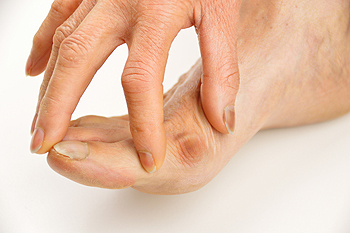
Bunions are often caused by genetics, abnormal foot structure, or arthritis, leading to the gradual misalignment of the big toe. People with a family history of bunions are more likely to develop them, as genetic factors can influence foot shape. Abnormal foot mechanics, such as flat feet or an imbalance in the way you walk, can put excessive pressure on the toe joint, contributing to bunion formation. Arthritis, particularly osteoarthritis, can also cause joint inflammation, leading to the development of bunions. Symptoms of bunions include pain, swelling, and redness at the base of the big toe. As the tip of the toe angles toward the second toe, it can be difficult to wear shoes and walk comfortably. In severe cases, the condition can cause stiffness or even hammertoe. A podiatrist can diagnose the condition and provide treatment options, including custom orthotics, anti-inflammatory medication, or surgery, if needed. If you have a painful bunion, it is suggested that you schedule an appointment with a podiatrist.
If you are suffering from bunion pain, contact Theresa Brown, DPM of Essie M.B. Smith Foot Clinic. Our doctor can provide the care you need to keep you pain-free and on your feet.
What Is a Bunion?
Bunions are painful bony bumps that usually develop on the inside of the foot at the joint of the big toe. As the deformity increases over time, it may become painful to walk and wear shoes. Women are more likely to exacerbate existing bunions since they often wear tight, narrow shoes that shift their toes together. Bunion pain can be relieved by wearing wider shoes with enough room for the toes.
Causes
- Genetics – some people inherit feet that are more prone to bunion development
- Inflammatory Conditions - rheumatoid arthritis and polio may cause bunion development
Symptoms
- Redness and inflammation
- Pain and tenderness
- Callus or corns on the bump
- Restricted motion in the big toe
In order to diagnose your bunion, your podiatrist may ask about your medical history, symptoms, and general health. Your doctor might also order an x-ray to take a closer look at your feet. Nonsurgical treatment options include orthotics, padding, icing, changes in footwear, and medication. If nonsurgical treatments don’t alleviate your bunion pain, surgery may be necessary.
If you have any questions, please feel free to contact our office located in Montgomery, AL . We offer the newest diagnostic and treatment technologies for all your foot care needs.



